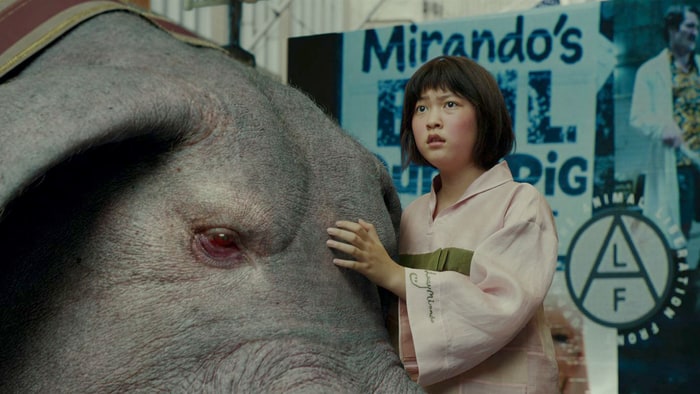

Last March in Manhattan, a bronze statue of a spunky young girl was installed such that she appeared to face down the famed charging bull of Wall Street. Fists to hips, legs akimbo, she is a cute, anodyne expression of female power. I couldn’t help thinking about this statue when I watched Okja, writer/director Bong Joon Ho’s follow up to 2013’s Snowpiercer. It’s not a subtle similarity — Okja follows the travails of a very brave little girl, Mija (Seo-Hyun Ahn), as her beloved super pig, Okja, is taken from the bucolic cliffs of Korea on a nightmarish journey into corporate America. The only question is how to feel about this growing prevalence of the little girl savior.
Aside from the heroic child, Bong presents a disjointed cast of absurd characters. Tilda Swinton plays a weak and needy tyrant, with a monochromatic, powder-pink wardrobe and a gawky overbite, who is giving her father’s heartless corporation a face-lift in the form of a ten-year project wherein a new breed of super pig is being raised by various international representatives to prove what excellent livestock they’ll make. Her employees include, Jake Gyllenhaal as an educational TV personality veering into irrelevance who all but twirls his mustache in a screechy, one-note caricature; Shirley Henderson (Harry Potter, Bridget Jones’ Diary) doing her usual nasally nervous wreck shtick; and Giancarlo Esposito (Gus Fring on Breaking Bad) giving an encore of his ascetic and well-groomed sociopath.
Okja is mercifully not played by a famous actor phoning it in, but is a feat of computer generation that looks like an elephantine pig with beagle ears and a propensity to tumble, belly flop, nuzzle, and snooze. She is very cute. Mija took the lead with Okja’s care, while her grandfather approached the project with bemused detachment. As the ten-year mark arrive and the Americans come to collect Okja, an incensed Mija disobeys her grandfather and runs away from home in pursuit. Hot on her trail is a group of non-violent eco-terrorists, headed by the perennially excellent Paul Dano, who is the only actor who effortlessly navigates Bong’s difficult tone of absurdity and earnestness.
As it progresses, though, this romp of a rescue story is complicated by a devastating plunge into the material reality of eating meat. The movie is all about saving Okja, but Okja is one of thousands of these pigs, prepped for slaughter.
Which returns us to the question of the brave little girl. I guess it’s an avatar for the power of innocence and earnestness. But I can’t help but bristle when women need to be desexed and decomplicated to earn our respect, and I bristle further at the audience’s license to identify with that purity and innocence. Wouldn’t it be nice if heroism were so spunky and sweet. But to tell a story of meaningful, systemic resistance, we can’t fetishize brave little girls. These things are difficult, and call for us to grow up at long last.